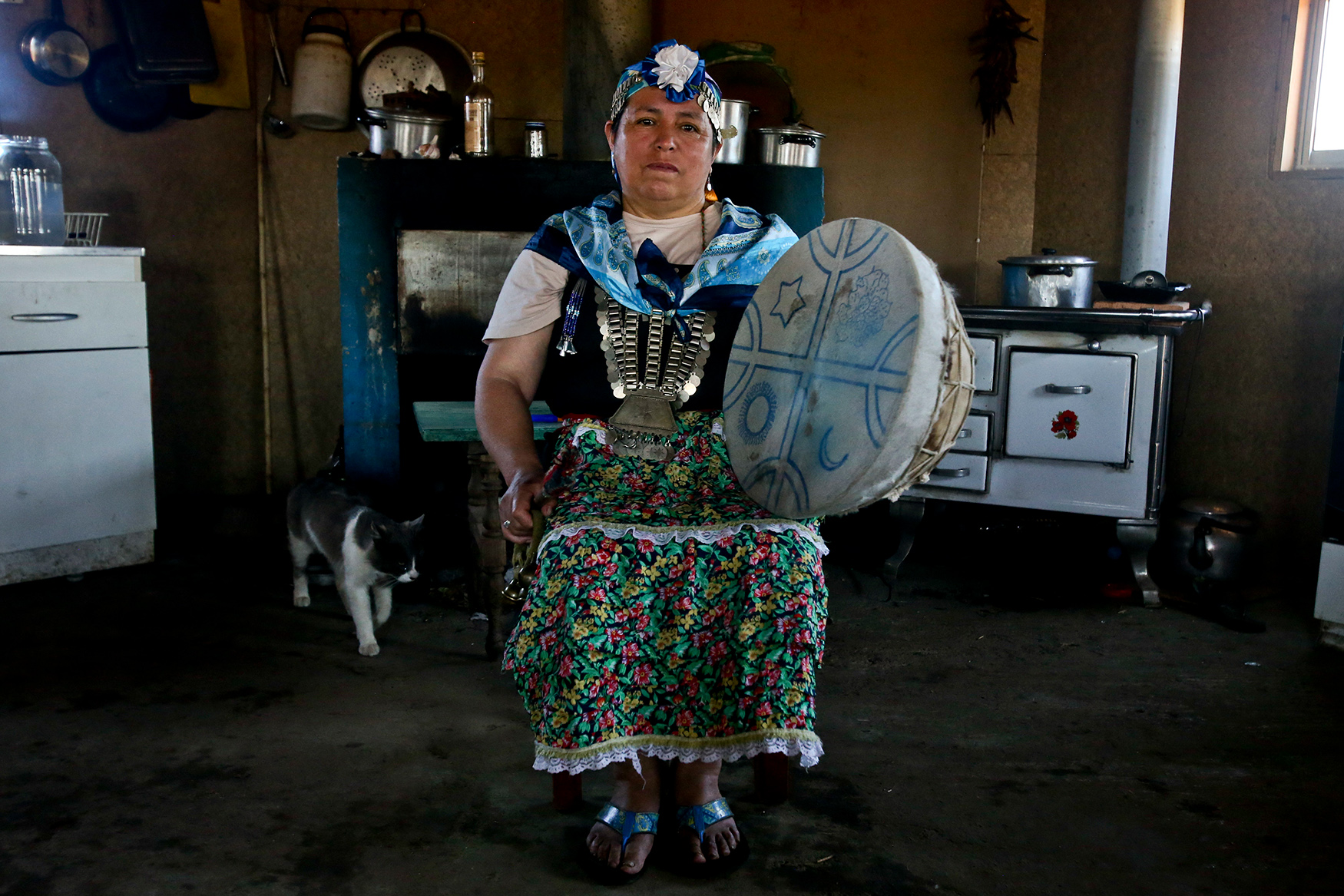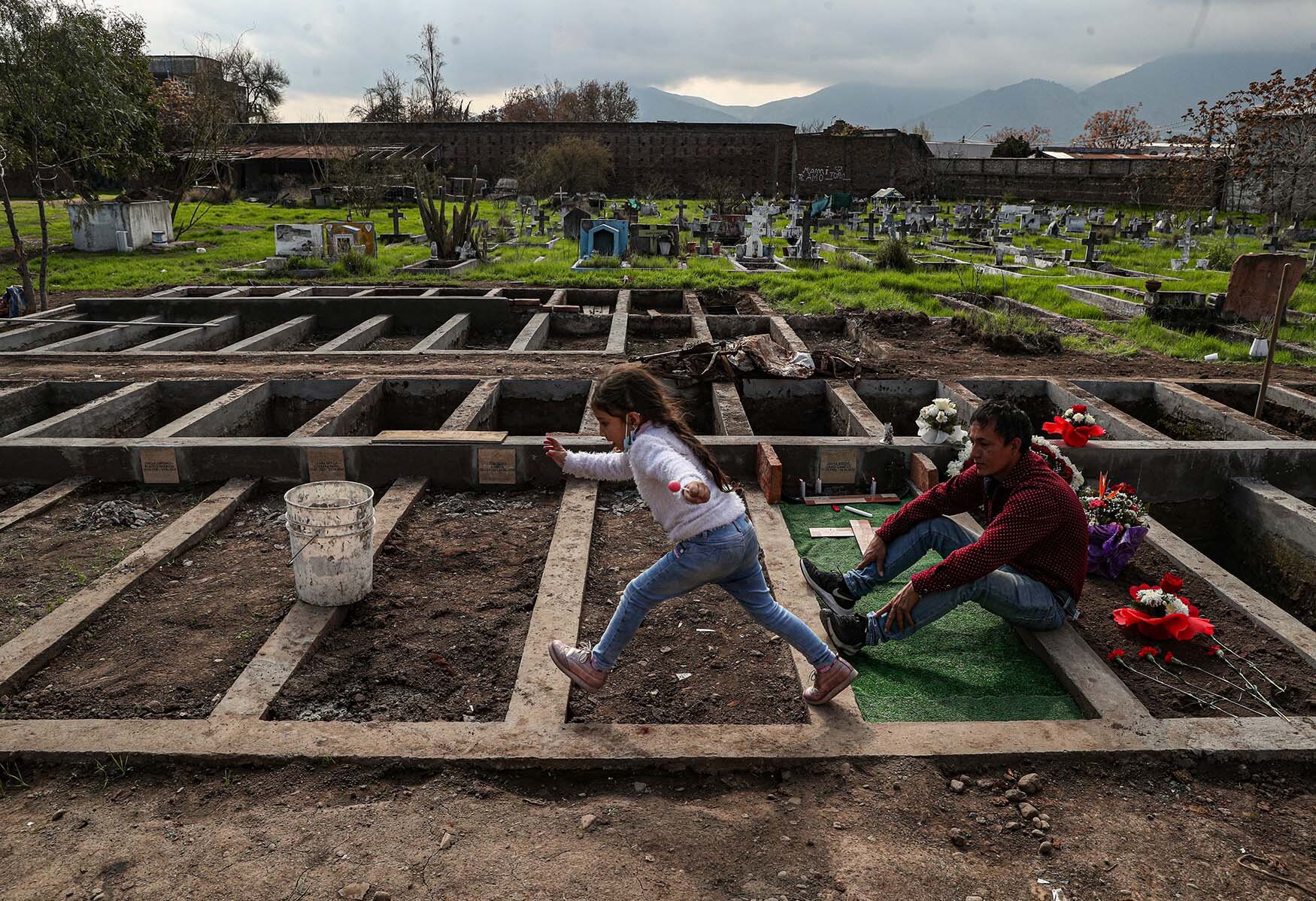Joy, angst over pope visit to Chile’s restive Mapuche region

When Pope Francis visits the de facto capital of Chile’s Mapuche people, he will be inserting himself into one of Latin America’s longest-running conflicts involving indigenous populations, and one that periodically erupts in violence.
Leaders of both the Mapuches and the Chilean government have said in recent weeks they hope Francis can facilitate dialogue on disputes dating to the late 19th century, when the Mapuches, known for their ferocity resisting Spanish and other European settlers, were definitively defeated by the Chilean military.
In this Monday, Jan. 8, 2018 photo, a truck filled with lettuce drives past the Maquehue Air Base, in Temuco, Chile. (AP Photo/Esteban Felix) | See these photos on AP Images
At stake are many thorny issues: ownership of ancestral lands in the southern Araucania region, legal recognition of the Mapuches’ language and culture, and discrimination that their leaders say permeates all facets of life.
“In practical terms, we as a people don’t exist. It’s shameful,” said Hugo Alcaman, president of ENAMA, a Mapuche group that encourages local businesses and advocates social change. “We need negotiations. We hope that the pope plants the seeds for it to happen.”
How far the pope goes in any statement supporting the Mapuches will be closely watched, and even fretted over. Francis, a native of neighboring Argentina and the first pope from Latin America, has shown strong support for indigenous peoples during visits in other countries. In Bolivia in 2015, he went so far as to apologize for the Roman Catholic Church’s “grave sins” committed against indigenous communities during the colonial era.
In this Sunday, Jan. 7, 2018 photo, Priest Claude Yves Dilayen baptizes a woman in the Mapuche community Newen Wenu Chau in Temuco, Chile, Sunday, Jan. 7, 2018. (AP Photo/Esteban Felix) | See these photos on AP Images
His visit to Temuco on Wednesday takes him to a region of high volatility. While the vast majority of Chile’s estimated 1 million citizens of Mapuche descent oppose using violence, a small number use it to push their agenda.
In recent years scores of churches have been among the targets — including three firebombed Friday in the nation’s capital, Santiago. Like in previous incidents in Araucania, pamphlets extolling the Mapuche cause were found at the scene of one of the churches, though no arrests were made and no group has claimed responsibility.
“There is both hope and worry about the pope’s visit,” said Emilio Taladriz, director of Multigremial de la Araucania, a conglomerate of unions across several industries. “The area is still one of conflict.”
This Jan. 7, 2018 photo shows paintings with Mapuche, Catholic and scenic motifs displayed for sale at a cultural fair in the Puerto Dominguez community in Temuco, Chile. (AP Photo/Esteban Felix) | See these photos on AP Images
Protests are expected in Temuco, including outside the Maquehue Air Base where the pope will celebrate Mass. It was built on land that was taken from Mapuches in the early 20th century and remains a point of friction.
Chilean authorities plan to deploy more than 4,000 police officers in Temuco’s streets as, flanked by 16 police vehicles, Francis rides in the popemobile down a central avenue before visiting an order of nuns.
A Mapuche choir will participate in the Mass, and afterward the pope will have lunch with a group of Mapuches hand-picked by local bishops.
Fernando Diaz, a priest in the Temuco area who has worked with Mapuches for years, expressed disappointment that Francis is not scheduled to meet with any of the leaders of the cause.
In this Sunday, Jan. 7, 2018 photo, Mauricio Painefil readies a traditional house known as a ruca for tourists, in the Mapuche community Llaguepulli, in Temuco, Chile. The Mapuche are successfully introducing ethno-turismo, sharing their ancestral traditions and culture. (AP Photo/Esteban Felix) | See these photos on AP Images
“The visit has been planned so the pope sees as little of the reality as possible,” Diaz said.
Massimo Faggioli, a Vatican expert and theology professor at Villanova University in Philadelphia, said every papal visit disappointments someone over who gets or does not get an audience, but the pope generally finds a way to carve out time for what is important to him.
“Usually Francis has a good ear and tries to adapt,” said Faggioli.
The first papal visit to Chile since Saint John Paul II in 1987 comes as the Catholic Church’s role with indigenous peoples in the Andean nation of 17 million people has shifted.
During the 1973-1990 dictatorship of Gen. Augusto Pinochet, many Chilean bishops pushed to protect native peoples and get their cultures recognized. But today the hierarchy is much more aligned with business interests.
In this Monday, Jan. 8, 2018 photo, a Mapuche covers a truck with lettuce harvested on a rented land near of the air base where Pope Francis will celebrate Mass, in Temuco, Chile. (AP Photo/Esteban Felix) | See these photos on AP Images
In 1987, John Paul II gave a pointed nod to Mapuches that surely prompted cringes within Pinochet’s government, which was unsympathetic toward indigenous groups and cracked down on any form of dissent.
During his homily, John Paul said faith in God could overcome all human-caused problems, implicitly referring to friction between Mapuches and the Chilean state.
“It’s for this reason that the pope, from Temuco, encourages the Mapuches to conserve with healthy pride the culture of its people,” the former pontiff said, adding that included “the traditions and customs, the language and its own values.”
Since then, the Mapuches have made significant strides. The return of democracy in Chile in the 1990s set the stage for creation of a government body, the National Corporation of Indigenous Development, that is dedicated to issues related to the country’s native peoples and spurred many changes.
In this Jan. 7, 2018 photo, Priest Claude Yves Dilayen enters a church to celebrate Mass in the Mapuche community Newen Wenu Chau in Temuco, Chile. (AP Photo/Esteban Felix) | See these photos on AP Images
In this Sunday, Jan. 7, 2018 photo, Priest Claude Yves Dilayen rest under the shade of a tree before celebrating Mass in the Mapuche community Newen Wenu Chau, in Temuco, Chile. (AP Photo/Esteban Felix) | See these photos on AP Images
Some ancestral lands have been returned. University scholarships have been set aside for Mapuches along with other benefits not open to all Chileans. Various aspects of Mapuche culture, such as many foods, have become part of the mainstream.
Still, problems persist, ranging from economic to social. Araucania remains the country’s poorest region, and Mapuches complain of frequent abuse at the hands of security forces.
One case that reverberated strongly in the community involved the arrest of two Mapuche brothers, ages 13 and 17, while police were searching for five wanted Mapuche men in December 2016.
In this Monday, Jan. 8, 2018 photo, the Mapuche flag flies over a traditional Mapuche home known as a rica, near the air base where Pope Francis will officiate a Mass, in Temuco, Chile. Francis’ visit comes as some radical Mapuche groups have been staging violent protests, occupying and burning farms, churches and lumber trucks to demand the return of their land. Protests are planned in Temuco during the papal visit. (AP Photo/Esteban Felix) | See these photos on AP Images
The 17-year-old, Brandon Hernandez Huentecol, was shot in the back by a police officer while face-down on the ground, resulting in a nearly two-month stay in the hospital and several surgeries for a shattered pelvis.
The officer has not been charged and failed to appear in court in response to a summons to testify.
Over a year later, the boy’s mother is beseeching Francis to bring his influence to bear.
“I know you are a man who professes Christian values and love for thy neighbor and for those who can’t defend themselves,” Ada Huentecol, said recently in an open letter to the pope. “That is why I ask that you help us, that you speak up and demand justice for my son.”
___
In this Sunday, Jan. 7, 2018 photo, a Mapuche woman wait for transport, in Temuco, Chile. Many Mapuche live in poverty on the borders of timber company land or ranches owned by the descendants of the Europeans who colonized the area after the indigenous resistance was quelled. (AP Photo/Esteban Felix) | See these photos on AP Images
In this Sunday, Jan. 7, 2018 photo, Chilean police guard the Santuario de la Virgen del Transito, in Temuco, Chile. (AP Photo/Esteban Felix) | See these photos on AP Images
In this Monday, Jan. 8, 2018 photo, Chilean police drive past the Maquehue Air Base, the air base where Pope Francis will celebrate Mass in Temuco, Chile. Chilean authorities plan to deploy more than 4,000 police officers in Temuco’s streets. Flanked by 16 police vehicles, Francis will ride in the pope mobile down a central avenue before visiting an order of nuns. (AP Photo/Esteban Felix) | See these photos on AP Images
In this Sunday, Jan. 7, 2018 photo, tourists eat in a Mapuche lodging in the Llaguepulli community in Temuco, Chile. The Mapuche are successfully introducing ethno-turismo, sharing their ancestral traditions and culture. (AP Photo/Esteban Felix) | See these photos on AP Images
In this Jan. 8, 2018 photo, Kallfurayen Llanquileo, a Mapuche healer and religious leader known as a "Machi," poses for a photo with her shaman drum at her home in the Mapuche community Enoco in Temuco, Chile. (AP Photo/Esteban Felix) | See these photos on AP Images
This Monday, Jan. 8, 2018 photo shows ceremonial Mapuche drums, known as kulbruns, stored on a kitchen shelf in the home of Kallfurayen Llanquileo, a healer and religious leader known as a Machi, in the Mapuche community Enoco, in Temuco, Chile. “In practical terms, we as a people don’t exist. It’s shameful,” said the president of ENAMA, a Mapuche group that encourages local businesses and advocates social change. (AP Photo/Esteban Felix) | See these photos on AP Images
In this Jan. 9, 2018 photo, a billboard welcomes Pope Francis in Temuco, Chile. When Francis visits the de facto capital of Chile's indigenous population, he will be inserting himself into one of Latin America's longest standing conflicts involving native peoples, which periodically erupts in violence. (AP Photo/Esteban Felix) See these photos on AP Images
Text from the AP news story, Joy, angst over pope visit to Chile’s restive Mapuche region, by Mauricio Cuevas and Peter Prengaman.
Associated Press writer Mauricio Cuevas reported from Temuco, and Peter Prengaman reported from Paihuano, Chile.
Photos by Esteban Felix
Visual artist and Journalist






